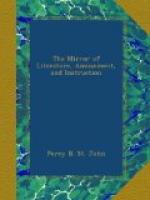of his labours and his glory. But in this engagement
he lost his right hand, which was struck off by the
blow of a yatagan. It is impossible to help being
moved with pity at the idea of the unfortunate traveller,
stretched upon the sand, writing painfully with his
left hand to his young wife, the mournful account
of the combat. Nothing can be so affecting as
this letter, written in stiff characters, by unsteady
fingers, and all soiled with dust and blood. This
misfortune was only the prelude to one far greater.
Not long afterwards, some people of Ghadames, who
had formed part of the Major’s escort, arrived
at Tripoli, and informed Colonel Warrington that his
relation had been assassinated in the desert.
Colonel Warrington could not confine himself to giving
barren tears to the memory of his son-in-law.
The interest of his glory, the honour of England,
the affection of a father—all made it his
duty to seek after the authors of the murder, and
endeavour to discover what had become of the papers
of the victim. An uncertain report was soon spread
that the papers of Major Laing had been brought to
Tripoli by people of Ghadames; and that a Turk, named
Hassouna Dghies, had mysteriously received them.
This is the same Dghies whom we have seen at Marseilles,
displaying so much luxury and folly, offering to the
ladies his perfumes and his shawls— a sort
of travelling Usbeck, without his philosophy and his
wit. From Marseilles he went to London, overwhelmed
with debts, projecting new ones, and always accompanied
by women and creditors. Colonel Warrington was
long engaged in persevering researches, and at length
succeeded in finding a clue to this horrible mystery.
The Pasha, at his request, ordered the people who had
made part of the Major’s escort to be brought
from Ghadames. The truth was at length on the
point of being known; but this truth was too formidable
to Hassouna Dghies for him to dare to await it, and
he therefore took refuge in the abode of Mr. Coxe,
the consul of the United States. The Pasha sent
word to Mr. Coxe, that he recognised the inviolability
of the asylum granted to Hassouna; but that the evidence
of the latter being necessary in the prosecution of
the proceedings relative to the assassination of Major
Laing, he begged him not to favour his flight.
Colonel Warrington wrote to his colleague to the same
effect. However, Hassouna Dghies left Tripoli
on the 9th of August, in the night, in the disguise,
it is said, of an American officer, and took refuge
on board the United States corvette Fairfield,
Captain Parker, which was then at anchor in the roads
of Tripoli. Doubtless, Captain Parker was deceived
with respect to Hassouna, otherwise the noble flag
of the United States would not have covered with its
protection a man accused of being an accomplice in
an assassination.
It is fully believed that this escape was ardently solicited by a French agent. It is even said, that the proposal was first made to the captain of one of our (French) ships, but that he nobly replied, that one of the king’s officers could not favour a suspicious flight—that he would not receive Hassouna on board his ship, except by virtue of a written order, and, at all events in open day, and without disguise.




